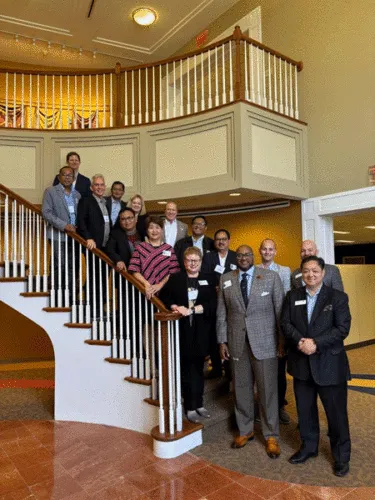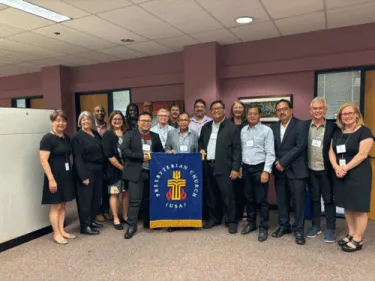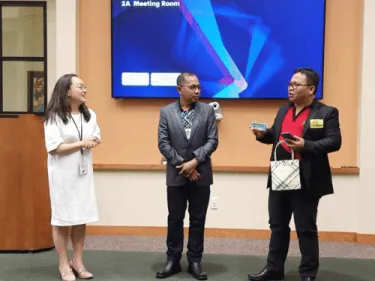Visit by United Church of Christ in the Philippines delegation marks new era of strategic partnership between churches
Dialogue marks beginning of self-reliance journey for PC(USA) partner in the Philippines


LOUISVILLE — A longtime partnership was elevated to a higher strategic level recently when a delegation of five United Church of Christ in the Philippines (UCCP) representatives visited the Presbyterian Church (U.S.A.)’s national offices earlier this year.
The visitors’ main objective was to learn more about PC(USA)’s fiduciary practices and the relationship between the Presbyterian Foundation and Board of Pensions to the PC(USA), A Corporation. The week-long dialogue session between the global partners focused on how transparency, accountability, and good governance are practiced between Church entities.
The relationship between Presbyterians and the Philippines dates back to 1899, when the first Presbyterians arrived there, and more recently since 1948 with the union of the five churches that created the UCCP — one being the Presbyterian church. The 1970s saw a partial missionary moratorium ceasing new missionary personnel and funds, but over the past three decades UCCP bishops, workers, leaders and PC(USA) Mission staff have partnered together for a wide range of mission involvement that includes Compassion, Peace & Justice ministries, the Office of Public Witness, the Office of Theology & Worship, Presbyterian Women, Presbyterian World Mission and the Office of the General Assembly.
Traveling with the UCCP delegation, and serving as facilitators for their Filipino guests, were the Rev. Cathy Chang, Presbyterian World Mission’s acting regional liaison for Southeast Asia and Pacific, and Cobbie Palm, mission co-worker serving in the Philippines. The two also assisted with post-meeting debriefing sessions and would clarify outstanding questions as needed.
According to Chang, the UCCP has entered a period of having established various entities and is looking at models and options to manage its resources more strategically and carefully, as well as forming a church workers (pastors) pension program.
Specific items of interest expressed by the UCCP, and discussed in detail during the week’s agenda, included:
- PC(USA) organizational and corporate structure (including allied companies and services)
- Function and nature of the Presbyterian Foundation in relation to the church and other bodies
- How are transparency, accountability, and risk maintained?
- How is corporate governance maintained?
- How is the human resources development plan implemented?
- How does the Church manage the welfare of church workers?
“The information UCCP delegates acquired from this visit will be beneficial to them as they embark on their journey to financial sustainability,” said Chang. “There will most certainly be follow-up from UCCP and there was some planning done for the [Presbyterian] Foundation to visit the Philippines in 2025 to discuss property development and continue conversations toward creating a foundation. In addition, UCCP extended an invitation to PC(USA) leadership to attend their next General Assembly meeting in May 2026.”

“We thoroughly enjoyed the opportunity to help host and get to know our colleagues from the UCCP during their visit,” said Rob Fohr, the Vice President of Strategic Alignment and Mid-Council Relations for the Presbyterian Foundation. “We found our conversations, exchange of ideas, and mutual learning to be deeply enriching. We look forward to our next opportunity to engage with them.”
Delegates from the UCCP included Bishop Joseph Agpaoa, Acting General Secretary, the Rev. Dr. George Lungay, Executive Secretary, Human Resource Development, Norman Ramiro, Chairperson of the Commission on Stewardship and Resource Development, Larry Millan, President/CEO Planted Vineyard Realty Corporation and former National Treasurer of UCCP (2014-2022), and Dr. Pio Baconga, President of Pilgrim Christian College.
“Church and mission work have evolved into different forms and shapes. The concerns have become more focused and purposeful,” said Millan. “These concerns may be internal or external, and there is also a certain level of sustainability and specialization required to ensure continuity and effectiveness. With this backdrop, there are different levels of partnership and engagement possible. It is no longer purely church work and activity in the traditional sense; we expect more focused gatherings and meetings in the future, and I expect a lot of learning will evolve from these shared opportunities."
“Conversations for this visit from the UCCP first started in 2018-2019, and as we all know, COVID-19 closed down the world in 2020. I am so grateful to Larry (Millan) for pursuing the conversation years later so that we could experience this wonderful gathering,” said the Rev. Mienda Uriarte, director of PC(USA)’s World Mission ministry. “The relationship between the UCCP and PC(USA) has deepened through years of meaningful engagement and continues to grow as we celebrate our shared legacy into the future.”
The UCCP delegation received several legal documents to study and adapt according to their purposes, and which might help them define and frame their organizational structures. According to Chang, the evolving UCCP structure will be shared throughout PC(USA), especially Presbyterian World Mission leadership and the General Assembly Committee on Ecumenical and Interreligious Relations (GACEIR), who seek to move towards a “more decolonial mission relationship.”

During opening worship, the Scripture passage where Jesus turns water into wine at the wedding in Cana (John 2:1-12), was used as the basis of shared reflections from UCCP and PC(USA) leaders. When UCCP’s acting general secretary, Bishop Joseph Agpaoa, spoke, he mentioned that Jesus had something to work with — water. In the Philippine context there are many lacking basic needs such as food and water. Yet he challenged that “lacking” mentality with UCCP and stated, “It may seem like we have nothing — but we also have resources. Maybe one day the UCCP can share ‘new wine’ with PC(USA),” — implying that perhaps the UCCP may invest in PC(USA) in the future.
“As it relates to the PC(USA) as a missionary legacy partner like UCCP, it may seem like a one-sided relationship — that the UCCP depends more on PC(USA) experience and financial support,” said Chang. “However, it is through this kind of dialogue where I believe the Church also needs UCCP presence and insight to better appreciate and navigate together the contours of 21st century missional relationships. It might be helpful to evaluate whether more partners are seeking this kind of engagement — and then facilitate more opportunities like this one.”
“This visit and dialogue between UCCP and PC(USA) mean a lot to the life and ministry of the Church, and emphasizes a strengthening of our partnership,” said UCCP’s Rev. Lungay. “To our end, this visit was purposeful and intentional, in line with the goal of becoming a self-reliant church. UCCP is looking forward to learning from PC(USA)'s experiences in terms of management and development, particularly in property and human resources through the different Church judicatories. Developing our property will lead to sustained life and ministry for the whole Church. That is why part of the reflection given by Bishop Agpaoa is based on the miracle story of the wedding in Cana: ‘We come to learn from you on how to make water into wine.’ With our partnership, through the leading of the Holy Spirit, we are confident in our commitment toward pursuing the cause of Christ's mission to the world.”
Participants from PC(USA) included the Rev. Jihyun Oh, Executive Director and Stated Clerk of the interim unifying agencies; Kathy Lueckert, president of PC(USA), A Corporation; the Rev. Mienda Uriarte, director, World Mission; April Davenport, PC(USA)’s newly-appointed general counsel; the Rev. Dr. Laurie Kraus, director of humanitarian and global ecumenical engagement; Dr. Dianna Wright, director of ecumenical relations in the Office of the General Assembly; several representatives of the Presbyterian Foundation including the Rev. Dr. Tom Taylor, president/CEO, Ben Hayden, senior vice-president, CFO, Danny O’Gara, senior vice-president and general counsel, the Rev. Dr. David Loleng, vice-president of church financial literacy and stewardship education, Robyn Davis Sekula, vice-president of communications, and Fohr. Representatives from the New Covenant Trust Company, Presbyterian Mission Agency, Presbyterian Women, the Presbyterian Investment & Loan Program, the Board of Pensions and the Presbyterian Publishing Corporation also participated.
You may freely reuse and distribute this article in its entirety for non-commercial purposes in any medium. Please include author attribution, photography credits, and a link to the original article. This work is licensed under a Creative Commons Attribution-NonCommercial-NoDeratives 4.0 International License.




